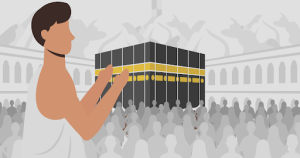The first pillar is Shahadah; the profession of faith in the oneness of God and acceptance of Muhammad as his messenger. The second pillar is Salat (prayers), performed at least five times daily facing Makkah. Thirdly, Zakat (almsgiving) involves paying 2 ½ % annual donation from one’s possessions for welfare purposes.
The fourth pillar, fasting during the Islamic month of Ramadan. The fifth pillar is a pilgrimage to Makkah at least once in a lifetime or to those who can perform it.
What is the Definition of the five pillars of Islam?
All Muslims are expected to follow the five pillars of Islam, which form the foundation of the Islamic faith. These five pillars, known as arkan al-Islam, remind people of their obligations toward God and humanity.
ٍo what are the five pillars of Islam? the answer is simple. Shahada, Prayers, Fasting, Zakah, and Haj. Below are simple explanations of what each pillar means:
- Shahadah: Declaration of Faith
Shahadah, or the Declaration of Faith, is the first of the 5 pillars of Islam. It is a simple statement declaring one’s faith in Allah and accepting Muhammad as His messenger.
As one Muslim scholar explains, “The testimony of faith is the most important pillar of Islam because it is a declaration that there is no deity but Allah and that Muhammad (peace be upon him) is His final Messenger.”
The Shahadah encapsulates Islamic beliefs and values in just two sentences – an affirmation that Allah deserves to be worshipped and obeyed with all one’s heart, mind, and soul.
For many Muslims, reciting this declaration daily serves as a reminder to live their lives according to Islamic teachings.
2. Salat: Ritual Prayer

The five pillars of Islam are the essential duties that all Muslims must follow to remain faithful. The second pillar is Salat or ritual prayer.
Salat is a practice that requires praying to God five times a day, at fixed times, and facing the Kaaba in Mecca. These prayers allow Muslims to express their devotion and commitment to God and His teachings.
During each prayer session, Muslims face Mecca, stand upright with hands open by their side, bow down and prostrate in reverence of Allah three times before standing again.
In each position, they recite specific verses from the Quran to show respect for the divine power of Allah and his commandments.
3.Zakat: Almsgiving

The third pillar of Islam is Zakat, the obligation to give alms to those in need. It is essential for Muslims need to give charity both financially and emotionally.
Zakat enables those blessed with wealth to share it with those less fortunate or struggling. This practice encourages believers to be generous, humble, and mindful of others’ needs as part of their faith.
Zakat requires that 2.5% of one’s savings are given away each year if one exceeds a certain threshold determined by Islamic law.
Individuals are also encouraged to donate beyond this amount if they can afford it; however set formula or prescribed amount must be granted annually.
4. Sawm: Ramadan Fasting
Islam is one of the world’s most prominent religions, and understanding its five pillars is essential to appreciate faith. Ramadan is the ninth month of the Islamic lunar calendar. It is observed as a month of fasting (or sawm in Arabic).
Fasting during Ramadan is one of the Five Pillars of Islam, which are five religious duties expected of every Muslim. During Ramadan, adult Muslims do not eat or drink anything (including water) from dawn to sunset.
5. Hajj: Pilgrimage to Mecca

The last pillar of Islam, The fifth pillar of Islam is the Hajj. Hajj is considered to be the most important pilgrimage for Muslims. The Hajj is an annual pilgrimage to Mecca that all Muslims are obligated to perform at least once in their lifetime.
Several rituals are involved in this pilgrimage, including praying on Mount Arafat, circling the Kaaba seven times, and stoning three pillars that symbolize Iblis (the Devil).
All pilgrims must wear special white garments known as ihram during these ceremonies. During the Hajj, pilgrims also have a chance to visit other holy sites such as Medina and Mina.
The significance of this ritual lies in its spiritual importance; it allows believers to deepen their faith by living out a key religious obligation and connecting with Allah.
You maybe want to read more: Islamic Studies
The Determination of the five pillars of Islam
The Five Pillars of Islam represent the foundation of the Islamic faith and are often seen as the most important aspects of living a life filled with peace, justice, and equality.
The Five Pillars consist of Shahadah (profession of faith), Salat (prayers or worship), Zakat (almsgiving or charity), Sawm (fasting during Ramadan), and Hajj (pilgrimage to Mecca). But how were these pillars determined, and by whom?
The pillars were initially established during the lifetime of Prophet Muhammad in 610 CE in Mecca after he received revelations from Allah through the angel Gabriel.
These five pillars are derived from the holy book Quran, which is considered an everlasting miracle revealed by God for humanity.
In addition, many other events such as Prophet Muhammad’s teachings actions and sayings known as Hadith had a great influence on forming these pillars.
Islam is a religion that emphasizes the importance of a strong spiritual connection between God and His followers. So, by now, you must know the answer to your Question: what are the five pillars of Islam? The five pillars of Islam are important religious duties that shape a Muslim’s faith, life, and community.
These five pillars include Shahadah (Declaration of Faith), Salat (Daily Prayer), Zakat (Charity), Sawm (Fasting during Ramadan), and Hajj (Pilgrimage to Mecca). However, Muslims are also expected to practice and encourage others to practice one of the five pillars if they have the means.









